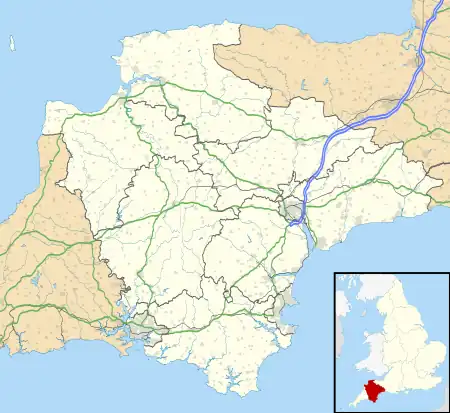| Ipplepen | |
|---|---|
 St Andrew's church | |
 Ipplepen Location within Devon | |
| Population | 2,446 |
| OS grid reference | SX8353766776 |
| District | |
| Shire county | |
| Region | |
| Country | England |
| Sovereign state | United Kingdom |
| Post town | NEWTON ABBOT |
| Postcode district | TQ12 |
| Dialling code | 01803 |
| Police | Devon and Cornwall |
| Fire | Devon and Somerset |
| Ambulance | South Western |
| UK Parliament | |
Ipplepen is a village and civil parish located within the Teignbridge district of the county of Devon in south-west England. A priory was located there. There is an electoral ward with the same name. The population at the 2011 census is 2,469.[1]
Location
Ipplepen is situated about 3.7 miles (6 km) to the southwest of the market town of Newton Abbot, 5.6 miles (9 km) from the southern edge of Dartmoor and about 6.8 miles (11 km) to the northwest of Torquay. Other nearby villages include Torbryan, Broadhempston, Denbury, Marldon and Abbotskerswell.
Amenities
Ipplepen now has one public house ('The Wellington') and it is situated close to the heart of the village and alongside the main road. The village's second public house ('The Plough Inn') was closed in January 2009 and then put up for sale, it was adjacent to the Conservative Club. There is also a primary school, park, bowling club, village hall, post office, general store, two churches, a medical centre and a Football Club with a very good youth section. The village library was temporarily closed in 2008, while a new library building was being built.[2] The main transport link is the A381 road to Newton Abbot and Totnes.
St Andrews Anglican parish church is a Grade I listed building.[3]
Population
The population of Ipplepen during 1801 and 1901 was 821 and 813 respectively. By the time of the 1991 Census in the United Kingdom, the population of 'Ipplepen with Torbryan' had increased to 2446. The average age was 42 years and 68.9% were described as being in 'good health'.
Archaeology
Archaeological excavations in Ipplepen have found Roman coins, a portion of a Roman road, a Roman age butcher shop, and various broken ceramics of Mediterranean and Gallic origin[4] which once contained wine, olive oil and garum (fish sauce).[5][6][7][8]
In February 2015 it was announced that a "major" Roman cemetery, including 15 skeletons, had been discovered during an archaeological dig at Ipplepen. Archaeologists said that the discoveries were both nationally and regionally important. One of the skeletons tested showed that the settlement was in use up to 350 years after the Roman period had ended in about 410 AD.[9] The site was originally discovered by metal detectorists.[10]
Notable residents
Notable residents of the past and present include:
- Sir Alfred Langler – journalist and editor[11]
- Rev. John Hewett was rural dean of Ipplepen[12]
- Bertram Fletcher Robinson – journalist, sportsman, editor & author.[13]
- Jon Lee – actor and former vocalist with the pop group S Club 7, lived in Ipplepen from age 7.[14]
- David St John Thomas - writer and publisher
- William John Wills (1834–1861) - explorer of Australia
References
- ↑ "Ward population 2011". Ukcensusdata.com. Retrieved 18 February 2015.
- ↑ "Village library battle moves to next stage". Torquay Herald Express. Archived from the original on 5 May 2013. Retrieved 10 February 2015.
- ↑ "Church of St Andrew, Ipplepen, Devon". Britishlistedbuildings.co.uk. Retrieved 1 March 2022.
- ↑ Specifically, the archaeologists found Samian ware.
- ↑ "Ipplepen: New Discoveries on the Edge of the Roman Empire". Torquay Museum. Archived from the original on 16 September 2019.
- ↑ "Ipplepen Iron Age Settlement – Ancient Village or Settlement in England in Devon". The Megalithic Portal. Archived from the original on 23 September 2018.
- ↑ "Roman oil and wine pottery found at Ipplepen dig site". BBC News. 20 June 2017.
- ↑ Morris, Stephen (16 September 2019). "New finds beef up case for redrawing map of Roman empire". The Guardian. Archived from the original on 16 September 2019.
- ↑ "Roman cemetery: Fifteen skeletons found at Ipplepen dig". BBC News. Retrieved 10 February 2015.
- ↑ Jessica E. Saraceni. "Roman Roadside Cemetery Unearthed at Ipplepen – Archaeology Magazine". Archaeology.org. Retrieved 10 February 2015.
- ↑ "Biography – Sir Alfred Langler – Australian Dictionary of Biography". Anu.edu.au. Retrieved 10 February 2015.
- ↑ Venn, John Archibald (1954). Alumni cantabrigienses; a biographical list of all known students, graduates and holders of office at the University of Cambridge, from the earliest times to 1900. Cambridge: Cambridge University Press. p. 348. Retrieved 6 August 2022.
- ↑ Whodunnit? Detectives reopen the strange case of Conan Doyle and the poisoned journalist, The Times, 17 September 2005
- ↑ Parkinson, Judy. "Mr McIntyre was one of those teachers you could have a laugh with". tes.com. Tes Global Ltd. Retrieved 8 April 2023.